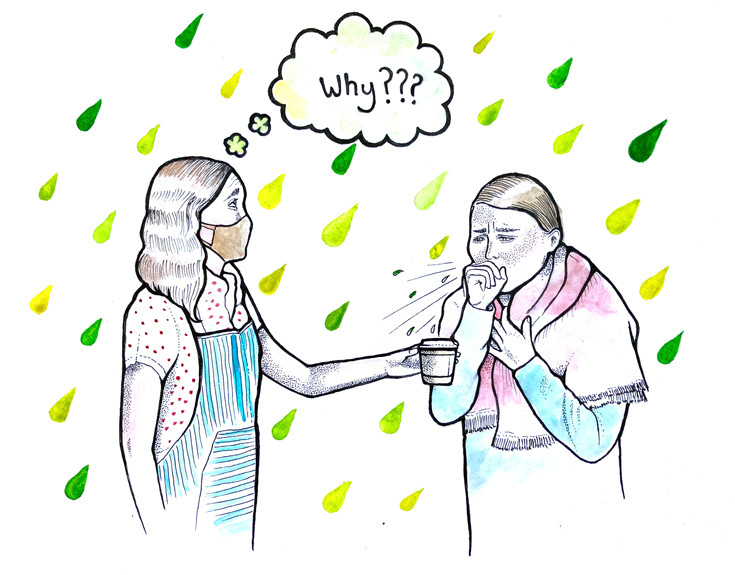Patience is a virtue, especially in customer service
Customer-service employees are tired of being mistreated

Illustration by Gabrielle Funk
Working in customer service for the last six years has probably shaved some time off my lifespan.
When the COVID-19 pandemic started, I worked at McDonald’s serving coffee, Egg McMuffins, McDoubles and Big Macs around the clock. These days, I work at a café, and the atmosphere is pretty similar: impersonal and fast-paced. My job is to welcome the customer, make their drink and send them off within a few minutes.
At both jobs, it’s common for a customer to make an employee cry for messing up their order. Often, it isn’t even the employee’s fault. Customers sometimes forget to ask for an extra drink or burger, but service workers are expected to smile while they’re being yelled at. As the famous saying goes, “the customer is always right.”
Recently, my supervisor and I were sworn at by a customer in the café, because someone had cut him off in line.
Before the pandemic, I already felt like I was tiptoeing around each customer, always playing the guessing game of “are they nice or not?” Now, not only am I wondering whether they’ll treat me with basic human decency, but I worry that they’ll pass COVID-19 to me and my coworkers.
On an average day, we serve anywhere between 200 to 400 customers. That’s 200 to 400 chances of getting sick.
Despite following all the safety regulations, such as wearing masks, social distancing, sanitizing our stations and equipment and washing our hands every 30 minutes, the chances of us contracting COVID-19 are still quite high.
Jobs involving frequent contact with the public and where social distancing may be hard to regulate at times, such as fast food and retail, are considered “medium exposure risk,” according to the World Health Organization.
If a service worker gets sick, it’s usually up to their employer to provide paid sick leave. However, they probably aren’t covered by paid sick days like those at other workplaces. I remember getting frustrated after learning that a friend of mine, who works at home as a graphic designer, received an additional two weeks of paid sick leave, while it took almost a month for McDonald’s to require wearing mask-wearing at work at the beginning of the pandemic.
Last May, Hartley Bilous, an employee at Foodfare on Portage Avenue, told CBC that working on the front lines “just wears you down, really, but you don’t have a choice. You still need to be making money, right?”
Although the Centre for Addiction and Mental Health has made recommendations to governments about the importance of prioritizing employee mental health during the pandemic, service workers still face mistreatment from customers on top of the fear of contracting COVID-19.
After asking friends about their experiences in customer service and their mental health, I found that it is common for service-industry workers to not have the luxury of taking a day off for our mental health. In most cases, we barely make enough to pay our bills, or we fear of being laid off.
I hope anyone reading this who works in the customer-service industry can feel reassured that they are not alone. For everyone else, please remember that patience and kindness go a long way.
Kim Uduman is a rhetoric, communications and theatre and film student at the University of Winnipeg. She believes everyone has a voice and hopes her writing and video work will let them be heard.
Published in Volume 75, Number 18 of The Uniter (February 11, 2021)






